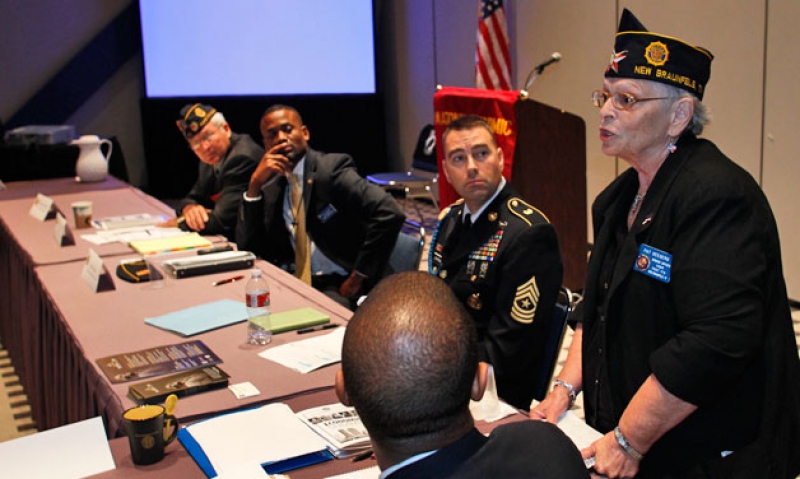
Promise to end homelessness can be kept
Key stakeholders gathered Aug. 24 during The American Legion’s 95th National Convention in Houston to assess the goal of eradicating homelessness among veterans and hear success stories from those on the front lines.
Panelists on the Homeless Veterans Roundtable agreed that progress was being made to end homelessness among veterans by 2015, a goal set by VA Secretary Eric Shinseki in November 2009. Shinseki had previewed the “Five Year Plan to End Homelessness Among Veterans” at The American Legion’s 2009 national convention in Louisville three months earlier, saying at the time, “No one who has served this nation should ever find themselves living without care - and without hope. To do this well, we will have to attack the entire downward spiral that ends in homelessness. We must offer education, jobs, treat depression, fight substance abuse and offer safe housing.”
Participants at this week’s roundtable, sponsored by the Legion’s Economic Commission, agreed that “functional homelessness” can be ended in the remaining 28 months of the five-year plan, according to Mark Walker, deputy director of the Legion’s Economic Division. But, he says, the struggle will not be easy. In fact, Walker says, the most challenging battle of the campaign is ahead. “Many of those who are left - and that is counting those in transitional or temporary housing - are the chronically homeless; those with conditions and circumstances that are especially challenging to aid.
“There will always be homeless veterans, we know that,” Walker said. “Due to extenuating circumstances, veterans may fall in and out of homelessness. But, what we feel is realistic and meets Secretary Shinseki’s goal is that by the end of 2015 we will have in place resources and practices that will assure any veteran who becomes homeless can get immediate aid. For instance, if you as a veteran find yourself on the street one day, we can have a roof over your head the next.”
In the quest to reduce the number of homeless veterans, it often takes volunteers to make a difference.
Pat Seegers, the historian and service officer at New Braunfels (Texas) Legion Post 179, shared a success story during the Homeless Veterans Roundtable.
Seegers, a Marine veteran of the Vietnam era, recalled the story of Terry, a homeless veteran in her community who needed help but had a history of refusing assistance.
Terry, a Vietnam veteran, had taken a bad fall and wound up in miserable shape and in great pain. He had to get to a VA hospital, but the closest was more than 30 miles away in San Antonio. Terry couldn’t make it by himself.
Seegers was dispatched to collect Terry. “He looked a little frightening,” she said, “with hair down to here,” pointing to the small of her back. “And, he liked to sound tough. But, I could see a real sweetheart underneath that gruff exterior and I fell in love with him right away.”
The connection was mutual because Terry began to cooperate with Seegers. Terry received the VA medical help he needed and other assistance, thanks to Seegers and other community volunteers.
In fact, through the generosity of fellow community members, Terry received access to a computer and the Internet. Going online, he learned that his daughter was looking for him, urging him earnestly to “come home.”
And Terry did.
